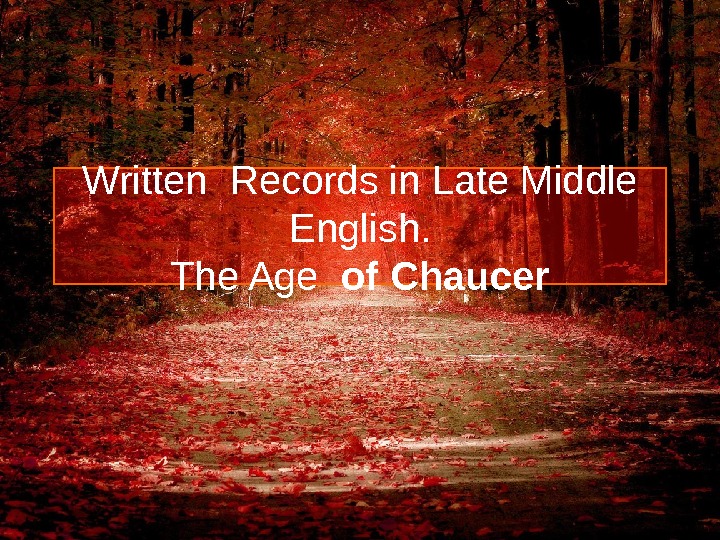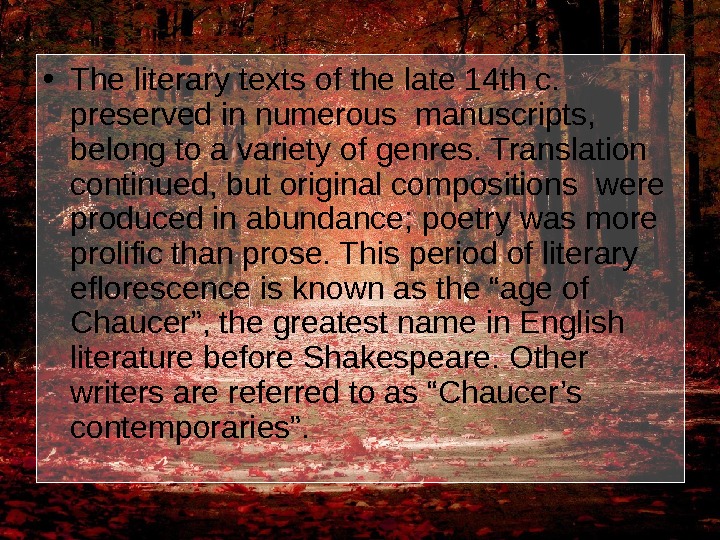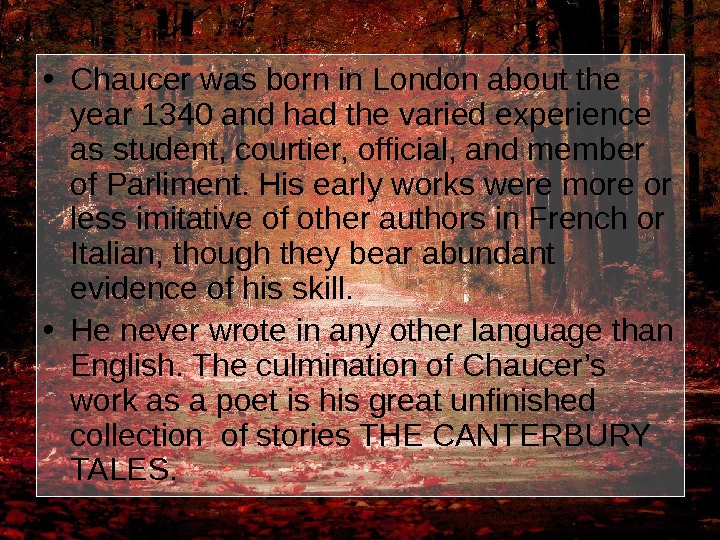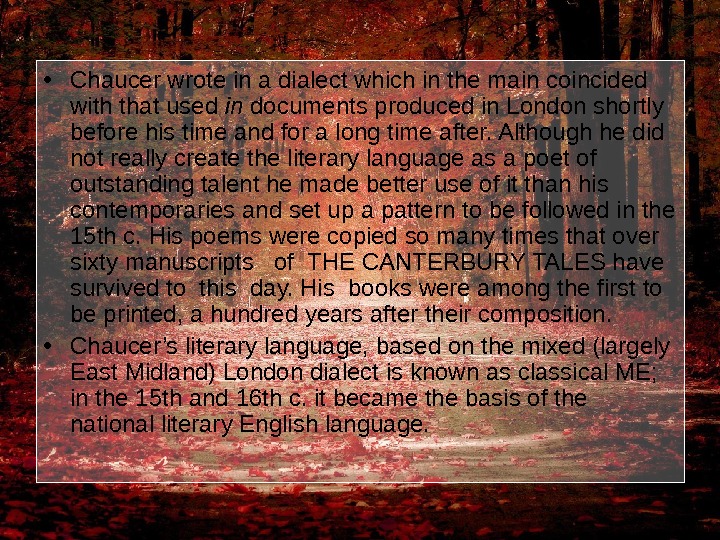Презентация Written Records in Late Middle English








written_records_in_late_middle_english.ppt
- Размер: 395 Кб
- Количество слайдов: 7
Описание презентации Презентация Written Records in Late Middle English по слайдам
 Written Records in Late Middle English. The Age of Chaucer
Written Records in Late Middle English. The Age of Chaucer
 • The flourishing of literature, which marks the second half of the 14 th c. , apart from its cultural significance, testifies to the complete reestablishment of English as the language of writing. Some authors wrote in their local dialect from outside London, but most of them used the London dialect, or forms of the language combining London and provincial traits. Towards the end of the century the London dialect had become the principal type of language used in literature, a sort of literary “pattern” to be imitated by provincial authors.
• The flourishing of literature, which marks the second half of the 14 th c. , apart from its cultural significance, testifies to the complete reestablishment of English as the language of writing. Some authors wrote in their local dialect from outside London, but most of them used the London dialect, or forms of the language combining London and provincial traits. Towards the end of the century the London dialect had become the principal type of language used in literature, a sort of literary “pattern” to be imitated by provincial authors.
 • The literary texts of the late 14 th c. preserved in numerous manuscripts, belong to a variety of genres. Translation continued, but original compositions were produced in abundance; poetry was more prolific than prose. This period of literary eflorescence is known as the “age of Chaucer”, the greatest name in English literature before Shakespeare. Other writers are referred to as “Chaucer’s contemporaries”.
• The literary texts of the late 14 th c. preserved in numerous manuscripts, belong to a variety of genres. Translation continued, but original compositions were produced in abundance; poetry was more prolific than prose. This period of literary eflorescence is known as the “age of Chaucer”, the greatest name in English literature before Shakespeare. Other writers are referred to as “Chaucer’s contemporaries”.
 • One of the prominent authors of the time was John de Trevisa • of Cornwall. In 1387 he completed the translation of seven books on world history POLYCHRONICON by It Higden from Latin into the South-Western dialect of English. Among other information it contains some curious remarks about languages used in England: “Trevisa: gentle man have now left to teach (i. e. “stopped teaching”) their children French. . . Higden: It seems a great wonder how Englishmen and their own language and tongue is so diverse in sound in this one island the language of Normandy coining from another land has one manner of sound among all men that speak it right in England. . . men of the East with men of the West, as it were, under the same part of heaven, accord more in the sound of their speech than men of the North with men of the South. ”
• One of the prominent authors of the time was John de Trevisa • of Cornwall. In 1387 he completed the translation of seven books on world history POLYCHRONICON by It Higden from Latin into the South-Western dialect of English. Among other information it contains some curious remarks about languages used in England: “Trevisa: gentle man have now left to teach (i. e. “stopped teaching”) their children French. . . Higden: It seems a great wonder how Englishmen and their own language and tongue is so diverse in sound in this one island the language of Normandy coining from another land has one manner of sound among all men that speak it right in England. . . men of the East with men of the West, as it were, under the same part of heaven, accord more in the sound of their speech than men of the North with men of the South. ”
 • Of greatest linguistic consequence was the activity of John Wyclif (1324— 1384), the forerunner of the English Reformation. His most important contribution to English prose was his (and his pupils’) translation of the BIBLE completed in 1384. He also wrote pamphlete protesting against the corruption of the Church. Wyclif’s BIBLE was copied in manuscript and read by many people all over the country. Written in the London dialect, it played an important role in spreading this form of English.
• Of greatest linguistic consequence was the activity of John Wyclif (1324— 1384), the forerunner of the English Reformation. His most important contribution to English prose was his (and his pupils’) translation of the BIBLE completed in 1384. He also wrote pamphlete protesting against the corruption of the Church. Wyclif’s BIBLE was copied in manuscript and read by many people all over the country. Written in the London dialect, it played an important role in spreading this form of English.
 • Chaucer was born in London about the year 1340 and had the varied experience as student, courtier, official, and member of Parliment. His early works were more or less imitative of other authors in French or Italian, though they bear abundant evidence of his skill. • He never wrote in any other language than English. The culmination of Chaucer’s work as a poet is his great unfinished collection of stories THE CANTERBURY TALES.
• Chaucer was born in London about the year 1340 and had the varied experience as student, courtier, official, and member of Parliment. His early works were more or less imitative of other authors in French or Italian, though they bear abundant evidence of his skill. • He never wrote in any other language than English. The culmination of Chaucer’s work as a poet is his great unfinished collection of stories THE CANTERBURY TALES.
 • Chaucer wrote in a dialect which in the main coincided with that used in documents produced in London shortly before his time and for a long time after. Although he did not really create the literary language as a poet of outstanding talent he made better use of it than his contemporaries and set up a pattern to be followed in the 15 th c. His poems were copied so many times that over sixty manuscripts of THE CANTERBURY TALES have survived to this day. His books were among the first to be printed, a hundred years after their composition. • Chaucer’s literary language, based on the mixed (largely East Midland) London dialect is known as classical ME; in the 15 th and 16 th c. it became the basis of the national literary English language.
• Chaucer wrote in a dialect which in the main coincided with that used in documents produced in London shortly before his time and for a long time after. Although he did not really create the literary language as a poet of outstanding talent he made better use of it than his contemporaries and set up a pattern to be followed in the 15 th c. His poems were copied so many times that over sixty manuscripts of THE CANTERBURY TALES have survived to this day. His books were among the first to be printed, a hundred years after their composition. • Chaucer’s literary language, based on the mixed (largely East Midland) London dialect is known as classical ME; in the 15 th and 16 th c. it became the basis of the national literary English language.

